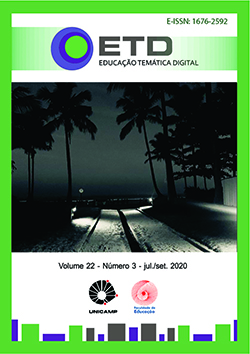Abstract
Teletandem enables future teachers of foreign languages the intercultural contact with a foreigner. In this virtual synchronous space via webcam, a person teaches his/her own language, or learns the mother tongue or language of competence of his/her teletandem partner. In this article, we argue (a) that the teletandem can be considered as a third space or a hybrid technological context; and (b) that, in addition to developing oral competence in the target language, this context can provoke future teachers' reflections on the pedagogy of foreign languages. We argue that both characteristics facilitate the professional development of future language teachers. We aim to investigate: (a) how this online intercultural contact mobilizes the commitment of the future foreign language teacher with his/her own professional training, and (b) how mediation activities (that follow the teletandem interactions) function as triggers of reflective processes on teaching and on learning foreign languages. The study was based on a teletandem partnership between a Brazilian and a Mexican university. We adopted a critical qualitative approach to the analyses of audio-recordings of group mediation sessions in which future Portuguese/Spanish teachers participated. The results of the analyses describe the characteristics of the online intercultural contact via teletandem. Although well articulated by the teacher educator, they bring the potential of theorizing and of critical observation of the students' own actions as teachers of foreign languages who are engaged in the process of their professional development.
References
ANDRÉ, M. O que é um estudo de caso qualitativo em educação? Revista da FAEEBA - Educação e Contemporaneidade, Salvador, v. 22, n. 40, p. 95-103, jul./dez. 2013.
ARANHA, S.; CAVALARI, S. M. A. A trajetória do projeto Teletandem Brasil: da modalidade institucional não-integrada a institucional integrada. the ESPecialist, v. 35, n. 2, p. 183-201, 2014.
BHABHA, H. K. O local da cultura. Belo Horizonte: Ed. UFMG, 2010.
CARSPECKEN, P. F. Pesquisa qualitativa crítica: conceitos básicos. Educação e Realidade. Porto Alegre, v. 36, n. 2, p. 395-424, maio-ago., 2011.
CASTRO, P. A. P. P.; TUCUNDUVA, C. C.; ARNS, E. M. A importância do planejamento das aulas para organização do trabalho do professor em sua prática docente. ATHENA: Revista Científica de Educação, v. 10, n. 10, jan./jun. 2008.
FELÍCIO, H. M. dos. O PIBID como “terceiro espaço” de formação inicial de professores. Revista Diálogo Educacional (PUCPR. Impresso), v. 14, p. 415-434, 2014.
GHEDIN, E. L. Professor reflexivo: da alienação da técnica à autonomia da crítica. In: PIMENTA, S. G.; GHEDIN, E. Professor reflexivo no Brasil: gênese e crítica de um conceito. São Paulo: Cortez, 2002.
GONÇALVES, S. C. L. Diretrizes para os Cursos de Graduação da UNESP: Letras: estudos resultantes do processo de articulação e integração dos cursos de Letras da Unesp. São Paulo: Universidade Estadual Paulista, Pró-Reitoria de Graduação, 2012. Disponível em: http://www.unesp.br/prograd . Acesso em: 19 set. 2019.
LARROSA, J. Algunas notas sobre la experiencia y sus lenguajes. In: BARBOSA, R. L. L. (Org.). Trajetórias e perspectivas da formação de educadores. São Paulo: Ed. Unesp, 2004. p. 19-34.
NOSELLA, P. Compromisso político e competência técnica: 20 anos depois. Educação e Sociedade. Campinas, v. 26, n. 90, p. 223-238, jan./abr. 2005.
SALOMÃO, A. C. B. A cultura e o ensino de língua estrangeira: Perspectivas para a formação continuada no projeto teletandem. 2012. Tese (Doutorado em Estudos Linguísticos) - Universidade Estadual Paulista, São José do Rio Preto, 2012.
SAVIANI, D. Formação de professores: aspectos históricos e teóricos do problema no contexto brasileiro. Revista Brasileira de Educação. v. 14, n. 40, jan./abr. 2009.
SIQUEIRA, R. A. R.; MESSIAS, R. A. L. Reflexão e ações na formação e atuação do professor de língua portuguesa: o diálogo como condição de autoria na prática educativa. Linguagem & Ensino, Pelotas, v. 11, n. 2, p. 377-392, jul./dez. 2008.
TELLES, J. A. Teletandem: uma proposta alternativa no ensino-aprendizagem assistidos por computadores. In: TELLES, J. A. (Org.). Teletandem: um contexto virtual, autônomo e colaborativo para aprendizagem de línguas estrangeiras no século XXI. Campinas: Pontes, 2009.
ZEICHNER, K. Repensando as conexões entre a formação na universidade e as experiências de campo na formação de professores em faculdades e universidades. Educação, Santa Maria, v. 35, n.3, p. 479-504, set./dez. 2010.
The ETD - Digital Thematic Education uses the Creative Commons license (CC), thus preserving the integrity of the articles in an open access environment.


